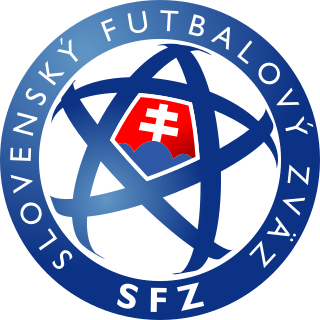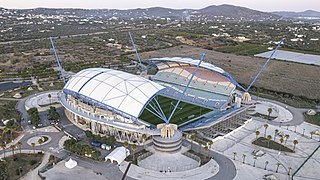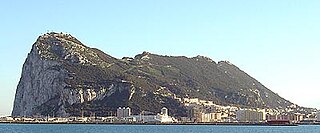
The 2004 UEFA European Football Championship, commonly referred to as Euro 2004, was the 12th edition of the UEFA European Championship, a quadrennial football competition contested by the men's national teams of UEFA member associations. The final tournament was hosted for the first time in Portugal, from 12 June to 4 July 2004. A total of 31 matches were played in ten venues across eight cities – Aveiro, Braga, Coimbra, Guimarães, Faro/Loulé, Leiria, Lisbon, and Porto.

The Republic of Ireland national football team represents the Republic of Ireland in men's international football. It is governed by the Football Association of Ireland (FAI).

The Liechtenstein national football team is the national football team of the Principality of Liechtenstein and is controlled by the Liechtenstein Football Association. The organisation is known as the Liechtensteiner Fussballverband in German. The team's first match was an unofficial match against Malta in Seoul, a 1–1 draw in 1981. Their first official match came two years later, a 0–1 defeat from Switzerland. Liechtenstein's largest win, a 4–0 win over Luxembourg in a 2006 FIFA World Cup qualifier on 13 October 2004, was both its first ever away win and its first win in any FIFA World Cup qualifier. Conversely, Liechtenstein is the only country that lost an official match against San Marino, albeit in a friendly match. Liechtenstein suffered its biggest ever loss in 1996, during qualification for the 1998 FIFA World Cup, losing 1–11 to Macedonia, the result also being Macedonia's largest ever win to date. The team's head coach is currently Konrad Fünfstück.

The North Macedonia men's national football team (Macedonian: Фудбалска репрезентација на Северна Македонија, romanized: Fudbalska reprezentacija na Severna Makedonija, represents North Macedonia in men's international football, and is administered by the Football Federation of Macedonia. The team play their home matches at the Toše Proeski National Arena in Skopje.

The Slovakia national football team represents Slovakia in men's international football competition and it is governed by the Slovak Football Association (SFZ), the governing body for football in Slovakia. Slovakia's home stadium from 2019 is the reconstructed Tehelné pole in Bratislava. Historically, up to the split in 1993, the team participated mostly as Czechoslovakia, while it also competed as Slovakia during the World War II.

The Estádio Algarve is an association football stadium located between Faro and Loulé municipalities, in the Algarve region of Portugal. The stadium has a capacity of 30,305 and was purposely built for the UEFA Euro 2004 championship.

The Gibraltar men's national football team represents Gibraltar in international football competitions, and is controlled by the Gibraltar Football Association. Gibraltar applied for full Union of European Football Associations (UEFA) membership and was accepted by the UEFA Congress in May 2013. It can therefore compete in the UEFA European Championship starting with the 2016 tournament for which the team competed in UEFA Euro 2016 qualifying Group D. On 13 May 2016 Gibraltar became a member of FIFA at the governing body's 66th Congress which was held in Mexico City. Gibraltar is the second smallest UEFA member in terms of population and the smallest in terms of area.

Lincoln Red Imps Football Club is a professional association football club from Gibraltar. They play in the Gibraltar National League, and share Victoria Stadium with all other clubs in the territory. They are the country's record champion with 27 league titles, including fourteen consecutive titles between 2003 and 2016, and in 2014 were the first team to represent Gibraltar in the UEFA Champions League's qualifying stage. In August 2021, Lincoln became the first club from Gibraltar to ever reach the group stages of a European club competition after defeating the Latvian champions Riga FC in the play-off round of the UEFA Europa Conference League.

Football has been a popular part of sport in Gibraltar since its introduction by British military personnel in the 19th century. The Gibraltar Football Association, founded in 1895, is one of the ten oldest active football associations in the world.

The Gibraltar national football team is the representative association football team of Gibraltar, a British Overseas Territory located at the southern tip of the Iberian Peninsula. Its governing body is the Gibraltar Football Association (GFA) and it competes as a member of the Union of European Football Associations (UEFA). Organised football has been played in Gibraltar since the 19th century. The GFA first applied for UEFA membership in 1997 which was rejected, as UEFA would only allow membership for applicants recognised as sovereign states by the United Nations. They were unsuccessful in their second application in 2007 when only three of UEFA's 52 associations voted in their favour. In October 2012, they reapplied for membership which was granted in March 2013. Before 2018 the team's home ground, Victoria Stadium, did not meet UEFA's standards for competitive internationals, although it could be used for international friendlies. Gibraltar's first full international was played at the Estádio Algarve, located between Faro and Loulé, Portugal, which Gibraltar used as their home stadium for competitive matches between 2014 and 2018, and again from 2023.

The UEFA Euro 2016 qualifying Group I was one of the nine groups to decide which teams would qualify for the UEFA Euro 2016 finals tournament. Group I consisted of five teams: Portugal, Denmark, Serbia, Armenia, and Albania, where they played against each other home-and-away in a round-robin format.
The UEFA Euro 2016 qualifying Group D was one of the nine groups to decide which teams would qualify for the UEFA Euro 2016 finals tournament. Group D consisted of six teams: Germany, Republic of Ireland, Poland, Scotland, Georgia, and Gibraltar, where they played against each other home-and-away in a round-robin format.
The 2018 FIFA World Cup qualification UEFA Group H was one of the nine UEFA groups for 2018 FIFA World Cup qualification. The group consisted of six teams: Belgium, Bosnia and Herzegovina, Greece, Estonia, Cyprus, and Gibraltar.

The Gibraltar national football team represents Gibraltar in association football and is controlled by the Gibraltar Football Association (GFA), the governing body of the sport there. It competes as a member of the Union of European Football Associations (UEFA), which encompasses the countries of Europe. Organised football has been played in the country since the 19th century. Gibraltar first applied for UEFA membership in 1997 which was rejected, as UEFA would only allow membership for applicants recognised as sovereign states by the United Nations. In October 2012, Gibraltar reapplied for membership and it was granted in March 2013.
Group 7 of the 2019 UEFA European Under-21 Championship qualifying competition consisted of six teams: Serbia, Austria, Russia, Macedonia, Armenia and Gibraltar. The composition of the nine groups in the qualifying group stage was decided by the draw held on 26 January 2017, with the teams seeded according to their coefficient ranking.
Group B of UEFA Euro 2020 qualifying was one of the ten groups to decide which teams would qualify for the UEFA Euro 2020 finals tournament. Group B consisted of five teams: Lithuania, Luxembourg, Portugal, Serbia and Ukraine, where they played against each other home-and-away in a round-robin format.
The 2022 FIFA World Cup qualification UEFA Group A was one of the ten UEFA groups in the World Cup qualification tournament to decide which teams would qualify for the 2022 FIFA World Cup finals tournament in Qatar. Group A consisted of five teams: Azerbaijan, Luxembourg, Portugal, the Republic of Ireland and Serbia. The teams played against each other home-and-away in a round-robin format.
The 2022–23 UEFA Nations League C was the third division of the 2022–23 edition of the UEFA Nations League, the third season of the international football competition involving the men's national teams of the 55 member associations of UEFA.
Group B of UEFA Euro 2024 qualifying was one of the ten groups to decide which teams would qualify for the UEFA Euro 2024 final tournament in Germany. Group B consisted of five teams: France, Gibraltar, Greece, the Netherlands and the Republic of Ireland. The teams played against each other home-and-away in a round-robin format.












